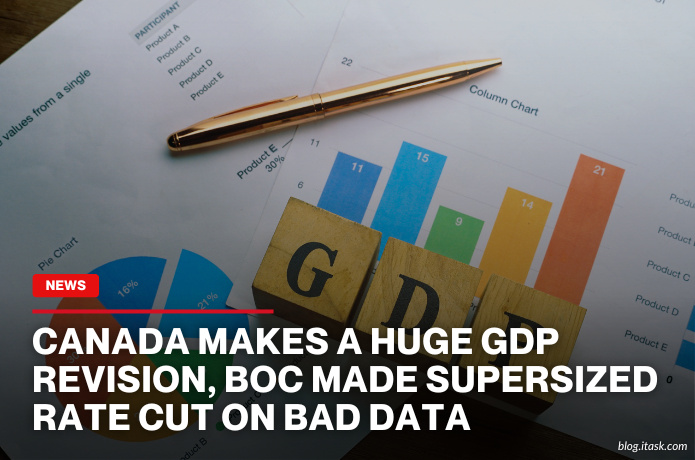Canada Makes A Huge GDP Revision, BoC Made Supersized Rate Cut On Bad Data
Canada Makes A Huge GDP Revision, BoC Made Supersized Rate Cut On Bad Data

Canada recently made substantial revisions to its Gross Domestic Product (GDP), dramatically increasing the estimated economic output for the past three years. Statistics Canada’s updated data reveals that the economy has been operating closer to its full capacity than initially believed, effectively adding the equivalent of an extra year of output. While this might seem like good news, the revision is causing significant policy concerns, particularly for the Bank of Canada (BoC), which recently enacted a double rate cut.
The BoC’s decision to implement an unusually large rate cut, slashing the overnight rate by 0.5%, was based on outdated assumptions of a substantial economic slowdown. This action is typically reserved for times of recession, not during stable or growing periods. The central bank believed inflation pressures were easing, but the revised data shows the economy is much stronger than previously thought, suggesting inflation risks are far from resolved.
The discrepancy highlights challenges in policymaking when data revisions occur. The BoC aimed to address a perceived economic gap that no longer exists under the new figures. Critics argue this could lead to unintended consequences, such as inflationary pressures due to cheaper borrowing costs. Economists worry that bond yields, inflation projections, and overall monetary policy may face volatility in the months ahead.
Additionally, the BoC is now caught in a tough position. The revisions imply that earlier interest rate hikes may have been justified, and the recent rate cut may exacerbate existing imbalances in the housing and credit markets. Policymakers are being urged to tread carefully to avoid overheating the economy or destabilizing financial systems further.
This situation underscores the complexity of economic forecasting and the risks of making policy decisions on incomplete data. The revised GDP figures suggest robust growth, but rising consumer insolvencies and an unsettled real estate market indicate underlying vulnerabilities in Canada’s economy.
Looking ahead, economists and analysts are closely monitoring the BoC’s next moves. With the new data, future monetary policies may shift to counteract inflation risks. Meanwhile, Canadians are left to navigate an economy that is stronger than assumed but still facing significant challenges.
